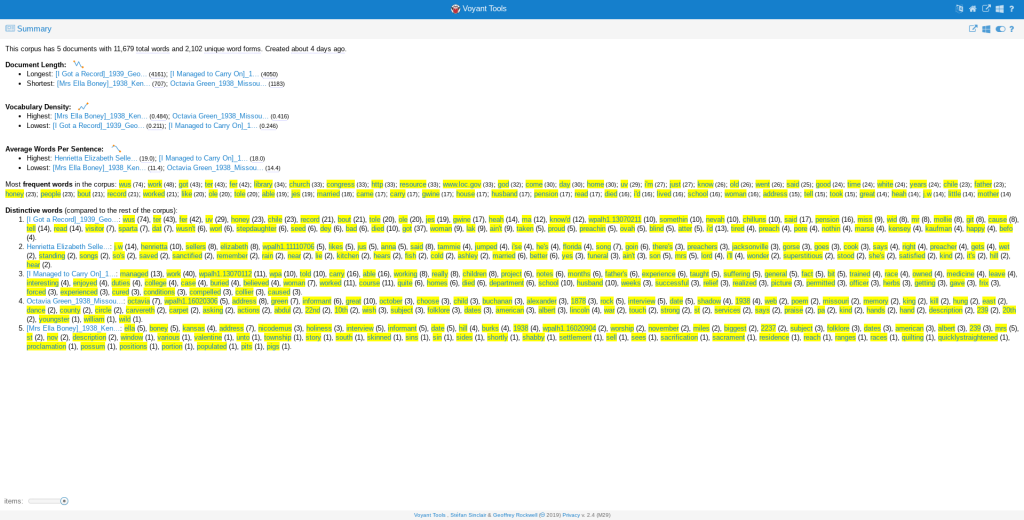In the FWP’s records how does the involvement and voice of African-American Women vary through singular vs. familial accounts?
Do African-American Women fall into the abyss of words and accounts as the corpus of FWP focuses on other voices?
I selected my sources by submitting myself to the mercy of the Library of Congress digital algorithms. After I used the African-American filter to ensure I was in the right place I picked the first 5 women’s accounts and the first 5 family/couples accounts. I did this because someone wanting to see the basic African-American women’s account would see these documents. So I purposefully did not use severe discretion with my options.
The Voyant tools were incredibly useful in thier scope in their use of distant reading. Uploading the corpus was easy and efficient. Of all the tools the “Distinct Word” and “Vocabulary Density” feature stood out the most. Voyant alligns the documents in terms of most which ones have the most dense vocabulary vs. the least dense vocabulary. The women’s and Familial accounts both have pretty evenly dense vocabulary, and the same ratio is in the document length.

These comparisons show that with this document sample can truly only tease certain questions. However, those questions it teases are lost within the confines of an overflow of text in the broad corpus.

My question is about the voices of African-American Women, and there is no way to that within the confines of this overwhelming amount of documents that the voice of a Minority can be heard. If I am to properly seek an answer to my question my 10 documents need to be the topic of study.
Everyone during the great depression was concerned about work. That concern is reflected in the common word in all data clumps of the word “work.” However, One particular feature that stands out among the comparison are the dialect words.

In the African-American women’s accounts dialect words are a huge component of the culture. One story in particular, [I Got a Record], records not only what she says but how she says it. Dialect history is as much as necessary part of history as any.
In the main corpus many of the dialect words are not present, and thus erases an element of the story. Their culture is lost in a see of words. Their stories are just so unique and different that it does not “fit” with the rest of storylines. For history to be told properly it needs to be organized according to catagory. Rather than an overarching narative filling the space a need for categorized and harmonious naratives are needed. Every topic must have a consideration of race and gender because it changes the perameters.
Historical questions are only as good as the tactics we use. If we wish to look at the broad picture of the entire corpus, then we see the main concerns of the entirety of the people. But with this decision lose certain aspects of it within the quantity of words. Distent reading is good for answering questions of generality, but close reading is necessary to understand the specific categorical naratives.
